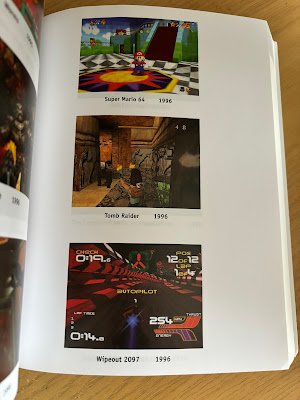I love a good rummage around charity shops. There is something to be said about finding old or out of print books, CD's etc, and also supporting a charity where you can. In this instance, a quick visit into the (now sadly closed) Oak Tree Animals charity shop in the Washington Galleries led me to this, a review compilation I'd never seen before, for three quid. Sold!
Published in 2006, the guide offers to take the reader from Pong to PlayStation 3, and given that it clocks in at 550 pages, it feels like it could do decent work. Flicking through the pages shows a clean layout and decently sized text - not too large to pad the tome out, not too small to cause eyestrain to your humble scribe.
The foreword is from Tim and Chris Stamper, whom at the point of publication were still at Rare (they would depart the company they co-founded the following year), and is a nice kick off to the contents proper - the games.
Arranged alphabetically, each title gets a star rating, details of developer, publisher, platform and year of release, then a write up by Mr Fox. Games are awarded scores out of five, with five going to a classic and one being poor. It's the in between that only kind of makes sense to me - four stars denotes excellence, three is good and two is fair. This does, in my humble opinion, weigh the scoring system to good or better titles. Given that the "comprehensive guide" wouldn't want to focus solely on bad games, and it could be argued that unless you deliberately target the crap end of the spectrum, you're going to have a predominance of three star games and above. In any case, every five star title gets a screenshot in the colour plate section in the centre of the book. The screenshots aren't huge but make a nice break from the text.
Starting at A, it soon becomes clear that the author knew his stuff when he started writing this book. Commentary is fair, albeit within the bounds that these are his opinions, and yours (and mine) can and will differ. Airwolf on the ZX Spectrum, for example, isn't worth two stars any day of the week, and the two stars Headhunter for the Dreamcast gets is a travesty! I also wouldn't consider SSX or Tiger Woods PGA Tour 2003 absolute classics (best spoken in a Welsh accent), but there you go.
Once you've passed Z, there's a chronology of the entries, from 1962 (Spacewar, naturally) to 2006 (too many to mention), followed by the similar list for hardware (DEC PDP-1 to Sony's PlayStation 3). Programmers and Designers get their own section, with a curated selection of games awards lists falling between those and the glossary.
Covering a five decade period, of course there are going to be games that are missed out, but at the same time, there are some obscure releases that get a proper mention, so swings and roundabouts abound. If I am going to be really picky, the entry for Zarch/Virus did grate a little. The full article is under the Virus entry, with Zarch's referring the reader to that. Virus may be the name people of a certain vintage remember the mouse-threatening controls, but the original was Zarch and as it's rated a four, surely deserves to be remembered under its original and best guise?
To be fair, The Video Games Guide is, to most, a curio of a long gone era - 2006 was a long time ago, yet it also provides a well written, handy resource for those who wish to learn about some of the less well known gems as well as the clunkers that tend to be forgotten. Voyeur on the CDi, anyone?
I am pleased I picked this up, not only for the charitable cause but also for the different points of view it gives on a wide selection of (now very) historical games. If the history of the art form holds your attention, then you'll get much use out of this book. Secondhand copies are available (at the time of writing) on Amazon for not much more than I paid for my copy, so have at it if you wish. I know I'll be referring to my copy for years to come.





No comments:
Post a Comment